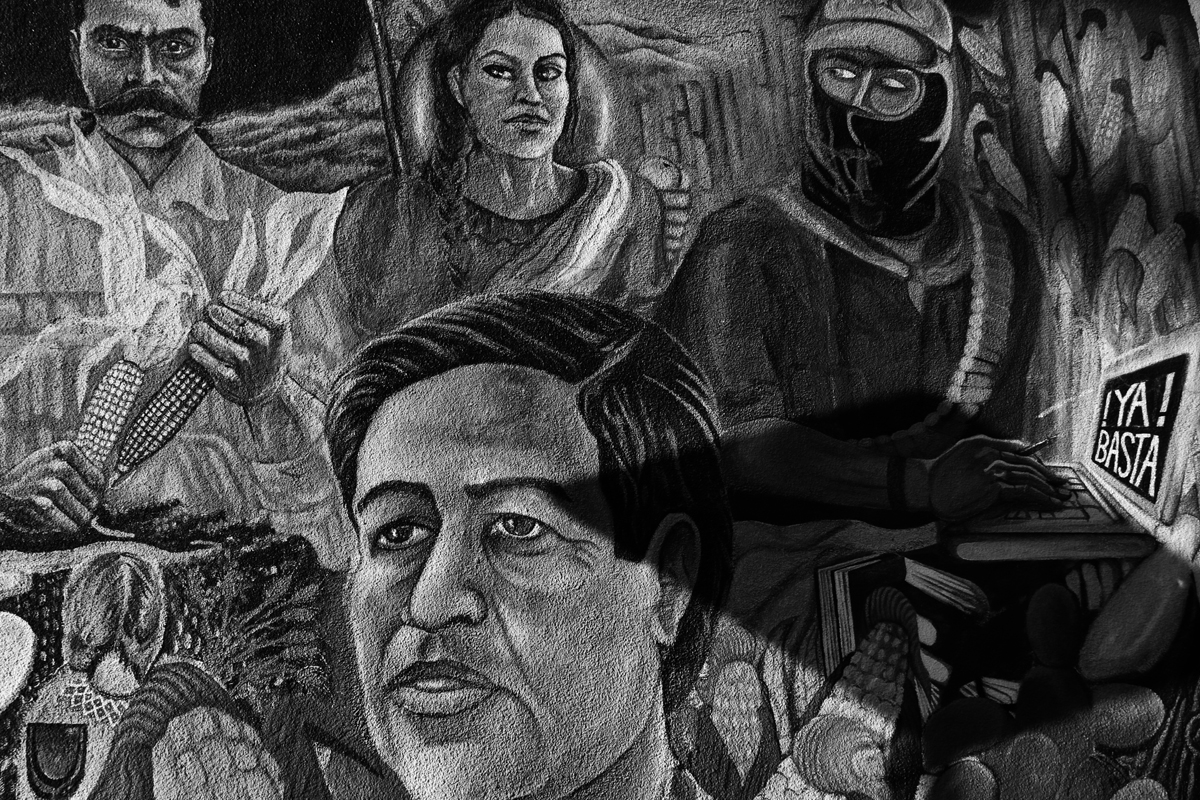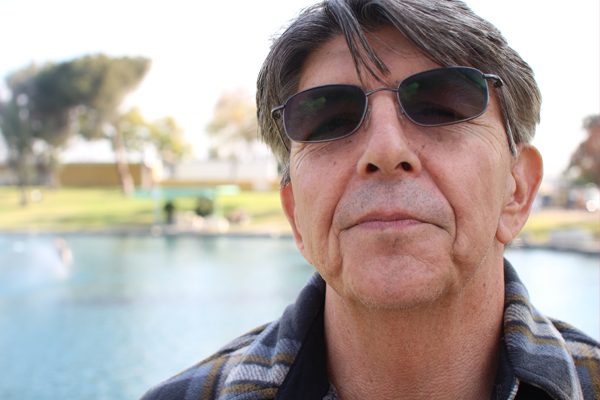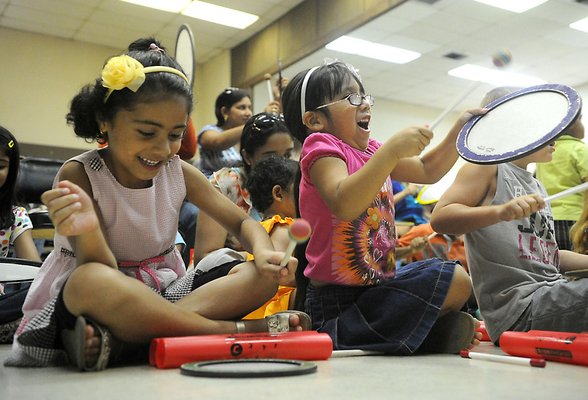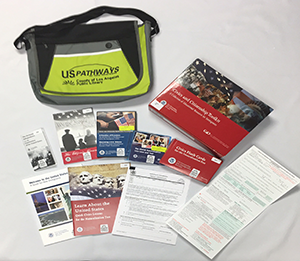Un Mitote Mas

One Saturday in the summer of 1970, I boarded a Tres Estrellas bus and headed south, down the International Highway taking me on my first in depth exploration of Mexico.
I was part of a group of one-hundred-and-fifty Chicano students who rented apartments at La Plaza Tlatelolco while attending classes at UNAM – La Universidad Autónoma de Mexico. I came searching for an identity, encouraged by my Chicano graduate student teachers at UCLA who nurtured me through the first two years, and by my mother’s prodding that I learn the truth about the land of my ancestors. I remember my high school teacher and mentor, Sal Castro, telling us: “Your people founded highly sophisticated civilizations on this continent, centuries before the European stepped on this land.” So this afternoon with this group of young enthusiastic men and women, I loaded my baggage on a coach that took us from Tijuana to Tenochtitlan.
That first day of travel started off full of excitement as we jockeyed for a seat next to someone with whom to share the experience. Once we sat down and the bus started to roll, the conversation focused on the women on the trip with us. Our bus was all male, another was all female, and the third carried the married and matched couples. After the subject was thoroughly reviewed, we took turns sharing why we came on the trip, what part of Mexico our parents were from, and how much Spanish we actually knew. Most of us, whose parents spoke mainly their native language, had that idioma deleted in school by teachers and deans who strictly enforced English-Only policies through corporal punishment. Those kids whose parents were second and third generation at the urging of their counselors took French or Italian as their foreign language requirement in high school.
After we drank all the beers the bus drivers provided and tired of the talking, we each settled into our seat. Images of people and places floated in and out as I sat by the window contemplating the passing panorama.
The words of Ruben Salazar crossed my mind: “A Chicano is a Mexican-American with a non-Anglo image of himself.” Looking around the bus, I realized I was part of a new generation seeking to redefine itself. What did I know about myself? Mother from Colima, father from Tabasco, and just like their geography, they were extreme opposites. My parents met, married, and divorced in Tijuana; but they ‘dropped me’ (I was born at Paradise Hospital) in National City, California, ten miles north of the border. They raised me in Tijuana until their divorce when I was five. I went to school, church, and to the bullfights on Sunday; my mother was a big fan of La Fiesta Taurina.
When I turned ten my mother used my dual citizenship to exchange her passport for a residence card. As I grew up, what I knew about Mexico came mainly from her recollections, and the conversations I overheard from her friends over the years. Usually, the talk revolved around heartache, tears, and suffering. Through my adolescence I never wanted to accompany my mother when she went to visit her family.
But now I was sojourning with other Chicano activists on this pilgrimage to the land of the chinampas. Six hours into our trip, we transferred from a luxury Greyhound bus to a transport with no air-conditioning, with one very small and smelly bathroom, and whose radio garbled sounds which gave me a headache. I shared the window with my new camarada, Mangas, a moniker he’d tagged himself: his real name was Richard, a six-foot-two-inch chain-smoking Vietnam vet who was a little older than most of us. We stared at the scorching, sun-drenched Sonora Desert until it was too dark to see anything. The rocking of the rickety bus lulled me in and out of sleep. Far in the distance a summer storm illuminated the distant mountains with veins of muted thunderbolts.
My mother gave me the thousand dollars I needed for this excursion; money she worked and saved over the years. In Tijuana she’d been a registered nurse at Salubridad caring for ficheras, prostitutes, and their clients, mostly American servicemen. When she came to the U.S. in her middle-age years, she did back-aching work: sowing, cleaning, and mopping kitchens and toilets in Brentwood and Bel Air homes.
After ten hours on the road, the driver pulled into the bus station in Culiacan, Sinaloa to refuel and to rest.
In high school, I had never smoked marijuana. Most of the parties and dances I went to only served beer and sometimes cheap liquor. Moctezuma, our high-school class valedictorian, was the first one I saw take out a joint and fire up. He hung out with college kids and professors, and showed off his high vocabulary that most of us football players didn’t understand.
But on the first days in the fall of ’68, just before classes started, and the first day I moved into the Brown House, I smoked my first toke. The Brown House was a student housing complex right behind fraternity row. The university rented it for ten of the fifty male Chicano special-entry students they couldn’t place in the dorms. Toby and I were the first to arrive that morning. He and I had been members of rival gangs back at Hollenbeck Junior High: him from Primera Flats and me from Tercera. But that was ancient history now.
After choosing my room, making my bed, and reading the first chapters of The Autobiography of Malcolm X in the early afternoon, I took a walk to the patio to stretch out. Toby was lying down in a couch with a headset and a peaceful look. He asked me if I had heard of “Hendrix.” I said, no. He handed me the headset. He lit a joint, took a deep drag, and then handed it to me. I imitated him, but instantly choked on the contents, coughing out the smoke which made my lungs explode. My eyes watered as the spasms subsided. I lay back to hear and feel the electrical impulses that oscillated in my brain and tingled down my body. With that I became a toker.
Being an only child, I was always hungry for friends. Smoking a joint became a gratifying communal experience. Those were times of sit-ins, teach-ins and love-ins, rallying at Royce Hall and occupying the Administration Building on Mexican Independence Day 1969. Smoking a joint broke down racial, economic, and gender barriers. It was cool to do! People got happy when they knew I had a joint to share. Scoring an ounce of weed for the ASB president got me many benefits.
In Culiacan, we had two hours to stretch our legs. The bus driver told us not to wander too far from the station; anyone not on the bus by midnight would be left behind to find other means of transportation.
My clothes clung to my body, wrinkled and wet with perspiration. The heat from the asphalt and cement singed my sandals. Four of us, including Mangas, wandered down the boulevard and found a place that served ice-cold beers and had outdoor tables. My compadre Humberto told me before I left LA: They grow some of the best marijuana on the outskirt farms of Culiacan. Eyeing a row of taxi cabs across the street from the bar, I spotted a young guy about my age, looking bored, leaning against his vehicle, smoking. I sauntered over and introduced myself, told him I was a tourist looking to score some ‘mota.’ The cabbie, with the cigarette dangling from his lips, right eye squinting, inspected me head to toe: long hair, beaded necklace, paisley shirt, bell-bottom jeans, and three-ply huaraches.
“Quizas,” he responded nonchalantly.
“Cuanto?” I asked. The fare would be twenty dollars, he said, but the price of the weed, la yerba, I would need to negotiate with the farmer. I ran back and told the guys, asked if anyone wanted to chip in, but they all passed, warned me it wasn’t a good idea to go into a strange city.
“If I score, are you going to want to smoke some?
“Hell, yes!”
I handed the driver the twenty and he smiled. His name was Nico and he was saving to go to the United States; Hollywood was the first place he wanted to visit – he was a movie fan. I sat in the back seat as Nico maneuvered around traffic. We rode silently beyond the city lights and out into the dark. Flickering like altar candles, distant fires illuminated the obscure surroundings. Somewhere down the highway Nico turned the cab onto a rutted road and it bounced and waded through tall grass and cornfields. After a long rough ride through back roads only he could distinguish, Nico stopped the car, got out, and left without a word.
As I sat alone waiting, the cow and pig shit mixed with the stench of my apprehension. It wasn’t the fear of being busted. This was the land of Don Juan, the same desert where the Yaqui shaman instructed Carlos Castaneda in his spiritual way of life. I began to imagine the wraiths and specters that had haunted this land and its people for thousands of years. I’d met Carlos when he came to speak at a MECHA meeting shortly after publishing his first book. Afterwards, a few of us invited him to smoke a joint with us in the parking lot, but he deferred. He explained that Don Juan introduced him to peyote and other psychotropic plants to help him achieve awareness to an alternate state which his very strict Western training prevented him from experiencing. Marijuana was a devil’s weed, he said, that clouds and confuses the thinking. In order to achieve awareness he needed a clear vision that would help him cross over to the spiritual dimension where he encountered his nagual, his spiritual guide. Afterwards, we laughed and thought him a square suit-and-tie man.
Suddenly a fog rolled in and enveloped the car. My thoughts dissipated in its mist. I felt lost. I waited for Nico to return. The night noises grew, augmenting with my breath and heartbeat. Tittering to myself, I suppressed the prayer I knew could save me, but I didn’t want to sell out my recently acquired agnosticism.
I’ve read that between heartbeats, a person can dream his entire life. I thought about mine. I came to Mexico to penetrate her mysteries, to uncover her secrets, to saturate myself in her splendor. Growing up in Tijuana, I barely fondled them. I wanted to be deep inside, experiencing unsounded sensations. Here I sat, along the back roads of my mind, alone. My thoughts wandered. Now a panic ran through me. Raw fear pounded through my heart and meandered in my imagination.
In the midst of this reverie, two heads popped through the back windows of the cab. Nico smiled, smoke dangling around his face. He nodded to the other side. The stern face of a farmer stared at me.
“This is Eusebio and this is his farm,” Nico said in the spitfire-Spanish of Sinaloa.
The man’s thick swarthy fingers clutched a big brown shopping bag which he handed to me. Opening it, I saw half of it filled with thick green buds that wafted the distinctive smell of freshly harvested marijuana.
“That will be another twenty dollars, Güero.”
The big ranchero fixed his eyes, waiting for my response. I dug in my pocket for my wallet, pulled out the bill, and extended it out to Eusebio. He smiled with pride as he withdrew and disappeared into the dew.
“Nice doing business with you, gringo.”
By the time Nico got me back to the depot, it was well past midnight. Mangas stood on the first step of the bus entrance staring down at the two drivers who were angrily shouting Mexican insults at him. Each bus had two conductors who took turns driving. Mangas knew only one phrase of this language, and their demeanor didn’t faze him. He’d faced Army sergeants and the Viet Cong.
“Where you been, ese? These vatos are getting ready to leave your ass. I think he said he’s gonna call the jura. That better be some good shit you got there.”
It was. Right after I took my seat, I handed Mangas my July issue of Playboy. He opened it to the center fold, and I dropped a wad of weed on it. Mangas expertly removed the rich round buds from the stems which he collected on his lap into a neat pile. Soon, perfectly round marijuana cigarettes emerged. I fired up the first and we started passing out the product of years of experience.
“Pinches gavachos grifos!” scowled one of the bus drivers as he glanced back at the scene developing behind them. “Estan armando un mitote.”
The mood livened throughout the bus. Someone pulled out his boombox and the steely sounds of Santana started; then the percussion section chimed in, and soon it became the backbeat in our travels. The conversation grew loud. We no longer spoke in pairs or groups, but like we did at our MECHA meetings, with passion and conviction. The Vietnam War preoccupied us all. Even though we got deferments for being in school, the draft lottery loomed in our lives. The only one not worried about it was Mangas. He had survived a year in ‘the bush.’ But now he faced jail time for the Walk Outs.
“Me vale madre!” was his favorite phrase. He didn’t give a shit.
At that moment none of us gave a damn either. We were high on the infinite possibilities for ourselves and for La Causa, committed to changing the world, eradicating injustice and inequality. It was our time.
The bus driver had refilled the ice-chest with beer. They must have felt the contact high of the smoke, because they started talking and laughing with gusto and passing out the cold cans of Tecate.
We bragged how we would become the Generation of Chingones that would turn it all around, revolutionize the system. We’d become the architects and engineers of a new society, the teacher and administrators who would implement the theories of Paulo Freire. The lawyers and judges who would argue before the Supreme Court defending the constitutional rights of Reies Lopez Tijerina, Cesar Chavez, and Corky Gonzalez.
We boasted and openly claimed what those before us dared not proclaim: a big piece of the American pie. The world was our oyster, and we were starved.
Daylight broke and we passed through one of the many small towns along our way, and I asked the drivers to find us a mercado where we could stop and eat. We had the munchies.

January 12, 2016










